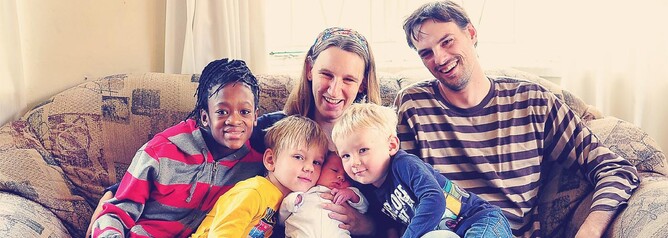A Day in our Lives in South Africa
Most days, we are up before the sun. Most days, we are up before the sun.
Sometimes, it is the local ‘recycling guys’ who are our (not-so-appreciated) alarm clock. They sleep down by the river, a few blocks from our house, and eke out a tiny living by collecting tin cans, plastic bottles and scraps of cardboard which they fish out of dustbins, dumpsters and storm-water drains around the city. It takes many kilograms of trash to make a buck, so, with no fixed abode to stash their winnings, they load it up in huge bags which they push around town on self-made, flatbed trolleys. Early in the mornings, they ride these trolleys down the slight slope of our street like an oversized skateboard. The cacophonous clattering of trolley wheels on bitumen is loud enough that it can be heard from several blocks away, but it is usually the terrifying crash as they hit the speed-bump right outside our bedroom window which jerks us awake.
More often, though, it is two, pint-sized sleep disturbers who put an end to my night’s rest. The baby of the family, like all the other Lamprecht babies before him, is a firm believer in the old adage that ‘sleep is for the weak’. His gleeful partner-in-crime is a little guy about the same age, who joined our crew five months ago, through foster-care. He is just one of the millions (nope — that’s not an exaggeration) of vulnerable children in this country; South Africa has a shockingly high number of orphans, as well as skyrocketing rates of child-abandonment and abuse. His future with us is uncertain, for a whole lot of sad, messy reasons we have no control over; but, as of right now, today, he is ours, and that is all that really matters.
I set the two of them loose to wreak havoc on the living room while I make myself a cup of tea and rusk (it might have been the Brits who developed ‘tea culture’, but it was the South Africans who, in my opinion, perfected it. I now know that the perfect accompaniment to a hot brew is an ‘Ouma Rusk’ — think of a fist-sized biscuit, with the taste of vanilla teacake but the texture of a brick. Don’t try and eat it without first dipping it in your cuppa — you’ll chipa tooth!).
If I were a Very Good Missionary, I’d tell you that it is at this point in the day in which I devote myself to an hour of scriptural study, meditation on His Word and intercession for the nations. The real truth is that, though I make a genuine attempt at it, mostly all I can manage is a quick read from my Bible and a prayer that the Lord please help me today to walk with Him, and grow to be more like Him, whilst I offer the twins nibbles from my aforementioned rusk like a pair of little baby birds, and ask them distractedly every so often to please climb down from the windowsill!
As soon as the rest of the clan is up, our day gets off to a roaring start. Herman heads off by car to battle his way through the early-morning Pretoria traffic into the city, where OM’s offices are. Driving in South Africa is not for the faint of heart — the iconic ‘taxis’ (privately owned minibuses which follow fixed routes throughout town) are a law unto themselves, and will, without qualm, drive up on the footpath, reverse down a main road, skip a red light, and stop, right in the middle of the road, to pick up passengers. Anything is permissible — so long as they put their hazard lights on first. permissible — so long as they put their hazard lights on first.
Thankfully, I don’t generally need to face that kind of stress to get the five kids to school, as school happens at home right now. To be honest, homeschooling our kids was not originally part of ‘the plan’, but it is working out well for our family for the time being. We do miss that community connection which comes from being part of a local school, but are otherwise really thankful for the opportunity to be so involved in our kids’ emotional, intellectual, social and, most importantly, spiritual development. On an average day, there are books strewn all over the living room; Lego structures threatening our soles in the hallway; bits of paper being written on, painted on, folded up and, at times, eaten (by the younger members of our crew); and flour, eggshells and cooking oil spilling over the edge of the kitchen counter (our daughter is currently an aspiring baker, and our waistlines bear the evidence of her developing skill). Really, it’s tremendous fun, and although some days (okay, most days) I have moments when I need to retreat to a corner and ask the Lord to “Please, give me patience!”, I know it is an enormous privilege to be able to stay at home with them.
Over at the OM offices, on an average day, Herman is knee-deep in paper: typesetting, printing, cutting and binding books to be used in ministry both by OM and other missions organisations in Africa. On a good day, he can complete about 100 books — although, if he slices off the end of his thumb with the guillotine, his speed slows considerably…We have a decently sized ‘support team’ based here in South Africa, serving our missionaries out on the field in 12 different countries/regions of Sub-Saharan Africa. We take care of handling the finances, maintaining the IT systems, fundraising for resources and screening and training new recruits so that they can continue on with the evangelism and discipleship which they do so well. Herman, who currently oversees communications/multimedia and IT departments, must spend quite a bit of time each day communicating with members of his team, scattered all over the African continent, either via email or on Skype.
It really is true when they say that there is place in missions for all types of skill-sets. A great lover of technology and gadgetry, Herman is often busy with research projects finding out about creative new methods for doing ministry in Africa. The Audi-Bible, a little solar-powered MP3 player which is preloaded with portions of Scripture in local languages, I must admit sounded a little gimmicky to me at first. I am so happy that I was wrong — this little device has proven hugely successful in the African context, and we hear amazing stories about how our workers are using it to share the gospel with previously unreached peoples. So, when Herman comes home and tells me he’s spent the day finding out if he can share the Jesus Film via Bluetooth or trying to figure out how to lock files on an SD card so they can’t be deleted accidentally, or ‘hacking’ a printer so that it can run on a continuous, pipe-fed ink system, or sourcing a flux-capacitor for his Goggo-mobile (okay, I made that one up — but, honestly, it all sounds like gobbledygook to me) I’ve learnt to trust his instincts and pray that God would use the potentially-awesome idea for His own glory.
When Herman gets home in the evenings, it is to excited cries of “Daddy, Daddy!” from a crowd of little (and usually very dirty) faces at the front window. Between the five of them, one joined our family through adoption, one through foster care and three ‘the old-fashioned way’, but it is easy to forget who is who in the mess of little bodies wrapped up in Dad’s loving embrace at the end of the day. We eat our evening meal together, squished around a too-small table in the kitchen (if the kids had their way, it would be boerewors, South African traditional farm sausages, every night; thankfully, my preferences get a look-in, and they are willing to accept good old Aussie apricot chicken from time to time) and then it’s bath for the little kids, dishes for the bigger kids, teeth, stories, Bible time, prayers and bed. I would feel a lot like climbing in to bed myself at this point, if there wasn’t a pile of laundry to be folded, emails to be written, nappies to be washed, and floors to be swept...
And then it’s the end of the day, and off to bed we trot. Some days are more exciting, to be sure — the kind of days which make great newsletter fodder; but in between those exciting days are a whole lot of ordinary, even sometimes mundane, ones. Every day, though, we are presented with the choice to be faithful and joyful in the day-to-day ‘ordinariness’ of our lives, and to look for the glimmers of supernatural extraordinariness, which we often find in the most unexpected places. Probably, this can be said of most people’s lives, and the life of a missionary is no exception.
So, as we bind another hundred books, surrender that last morsel of rusk to a pair of tiny tyrants, cook a meal for a struggling friend, or email a government official for help with visas AGAIN, we join with Brother Lawrence, the monastery kitchen worker, who reminds us: “We ought not weary of doing little things for the love of God, who regards not the greatness of the work, but the love with which it is performed.”
by Belinda Lamprecht


